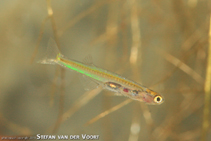| Family: |
Danionidae (Danios), subfamily: Danioninae |
| Max. size: |
1.67 cm SL (male/unsexed) |
| Environment: |
benthopelagic; freshwater |
| Distribution: |
Asia: stream near Sha Du Zup in northern Myanmar. |
| Diagnosis: |
Vertebrae: 36-37. Differs from its congeners, Danionella translucida and Danionella mirifica, in having the following characters: a single bone in the upper jaw (versus two); a single row of 6-13 odontoid processes in males on the dorsal surface of the dentary and on the ventral surface of the upper jaw, the anteriormost processes of which are large and canine-like
(versus absence of processes); absence of maxillary-mandibular cartilage (versus presence); the possession of 7C8, 8C7 or 8C8 principal caudal fin rays (versus 9C9), dorsal procurrent rays 3-4 (versus 5-6) and ventral procurrent rays 2-3 (versus 4-6) (Ref. 81221).
Description: dorsal-fin rays ii, 4-5, i? anal-fin rays ii, 9-11, i? pectoral-fin rays i, 4, ii; and pelvic-fin rays i, 3, ii in females and i, 4, i in males (Ref. 81221). |
| Biology: |
Inhabits small stream (Ref. 81221). |
| IUCN Red List Status: |
Data deficient (DD); Date assessed: 02 November 2009 Ref. (130435)
|
| Threat to humans: |
harmless |
Source and more info: www.fishbase.org. For personal, classroom, and other internal use only. Not for publication.
